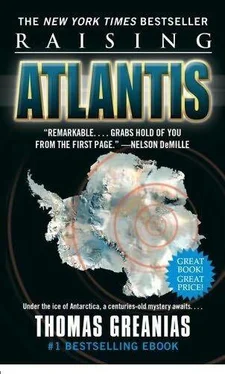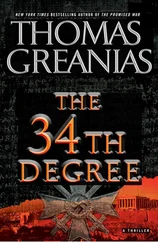“I’m glad to hear you say that.” There was tenderness in the pope’s eyes and a tone of disbelief in his voice as he asked her, of all people: “Sister Serghetti, I want you to pause and consider whether the Spirit is prompting you in your heart to take on a holy mission that may truly make you worthy of your calling as Mother Earth.”
The only thing the Spirit was telling her was that something wasn’t right here. She had rebuked the Vatican and left the Church. Now the pope was asking her to be his official emissary. “What sort of mission?”
“I understand you are an official observer and adviser to the implementation of the international Antarctic Treaty.”
“I’m an adviser for the Treaty’s Committee for Environmental Protection,” she explained. “But I represent Australia, Your Holiness, not the Church.”
The pope nodded and tapped his fingers on his arm-rest. “You know those recent news reports about seismic activity in Antarctica?”
“Of course, Your Holiness. A glacier the size of Delaware was sliced off last month after the most recent temblor. And another one the size of Rhode Island broke away before that. In short order it may all add up to the equivalent of the entire eastern seaboard of the United States.”
“What if I told you that our intelligence sources have located a secret and illegal American military expedition in Antarctica, in land claimed by your own homeland, Australia?”
“I’d say the Americans are violating the Madrid Protocol of 1991, which established Antarctica as a zone of peace reserved exclusively for scientific research purposes. All military activities are banned from the continent.” Serena leaned forward. “How do you know this?”
“Three U.S. spy satellites recently disappeared from orbit,” he explained.
She blinked. How long had the Vatican been in the business of tracking foreign spy satellites? “Perhaps they stopped working or were deliberately destroyed,” she suggested.
“Dead U.S. satellites are usually left in orbit,” the pope explained as easily as if he were discussing New Testament hermeneutics. “And if one satellite, let alone three, had died, congressional overseers would have made more noise than Vatican II. That did not happen.”
“I’m afraid we’ve stepped beyond my area of expertise, Your Holiness,” Serena said. “What are you suggesting happened?”
“The satellites were placed into orbits that would move more slowly across the skies than other high-altitude spy cameras, giving them more time to photograph targets.”
“Targets?”
“Military strikes are usually mounted immediately before a spy satellite passes overhead, so they can record the damage before the enemy has time to cover it up. But after the latest seismic activity in Antarctica, no known spy satellites would have passed over the affected area. That suggests that one or more of the missing satellites may be watching.”
“Are you suggesting the U.S. military is actually causing those seismic shock waves?” she asked.
“That’s what I want you to find out.”
She sat back in her chair. The pope had no reason to lie to her. But there must be more to this than what he was telling her. Why else would the Holy See take such profound interest in an empty continent populated by more penguins than Catholics?
“Is there something more you want to tell me?” she asked. “Does it involve Doctor Yeats?”
The pope nodded. “He apparently has joined the American expedition in Antarctica.”
So it did involve Conrad, she realized, but in an altogether unexpected scenario. “Why would the American military need an archaeologist?”
The pope said nothing, and Serena knew in an instant that the Vatican was enlisting her help as a linguist and not as an environmentalist. All of which meant the Americans had found something in Antarctica. Something that would require the expertise of archaeologists and linguists. Something that had clearly rattled the Vatican. The only reason the pope was reaching out to her was because he had no other choice. The Americans obviously weren’t consulting with him. But perhaps they should have, she suddenly realized.
“You have something to show me, don’t you, Your Holiness?”
“I do.” With gnarled fingers, the pope unfurled a copy of a medieval map across his desk. It was dated 1513. “This was discovered in the old Imperial Palace in Constantinople in 1929. It belonged to a Turkish admiral.”
“Admiral Piri Reis,” she said. “It’s the Piri Reis World Map.”
“You recognize it, then.” The pope nodded. “So you’ve undoubtedly seen this too.”
He passed across an old U.S. Air Force report. It was dated July 6, 1960, code-named Project Blue Book.
“No, I haven’t,” she said with interest, picking up the slim report. “Since when does the Vatican have access to classified American military intelligence?”
“This old report?” the pope said. “I’d hardly call it classified. But the addendum is.”
She thumbed through the pages, written by the chief of the cartographic section of Westover Air Force Base in Massachusetts. The conclusion of Air Force officials was that the Antarctic portions of the Piri Reis World Map did accurately depict the Princess Martha Coast of Antarctica and the Palmer Peninsula.
Her eyes lingered on the last page, where Lieutenant Colonel Harold Z. Ohlmeyer of the Eighth Reconnaissance Technical Squadron wrote:
The geographical detail shown in the lower part of the map agrees very remarkably with the results of the seismic profile made across the top of the ice cap by the Swedish-British-Norwegian Antarctic Expedition of 1949. This indicates the coastline had been mapped before it was covered by the ice cap. The ice cap in this region is now about a mile thick. We have no idea how the data on this map can be reconciled with the supposed state of geographic knowledge in 1513.
Then came the Pentagon addendum, dated 1970 and handwritten in bold strokes by USAF Colonel Griffin Yeats. She knew that this was Conrad’s father, and it made the hair on her neck stand on end. The note said:
All future reports regarding Piri Reis World Map and Project Sonchis shall be passed through this office and classified accordingly.
“Sonchis,” she repeated, closing the report.
“Any significance?”
“There was an Egyptian priest named Sonchis who allegedly provided Plato with his detailed account of Atlantis.”
“Admiral Reis’s map states it is based on even earlier source maps going back to the time of Alexander the Great.”
“You’re saying what exactly, Your Holiness?”
“Only an advanced, worldwide maritime culture that existed more than ten thousand years ago could have created these source maps.”
Serena blinked. “You believe that Antarctica is Atlantis?”
“And its secrets are buried under two miles of ice,” he said. “What we are dealing with is not just a lost ancient civilization, but the lost mother culture your friend Doctor Yeats has been searching for, one possessing scientific knowledge that we have yet to comprehend.”
“If this turns out to be real it will throw many things into question,” Serena replied, “including the Church’s interpretation of the Genesis account in the Bible.”
“Or uphold it,” the pope said, although he didn’t sound hopeful. “But should that be the case, we are all the worse for it.”
“You’ve lost me, Your Holiness.”
“God has shown me a prophecy about the end of time,” he said. “But I have not revealed it to the Church because it is too terrible to contemplate.”
Serena sat on the edge of her seat. Her usual concerns aside, this pope certainly seemed to have control of his senses and be of sound mind. “What did you see, Your Holiness?”
Читать дальше












